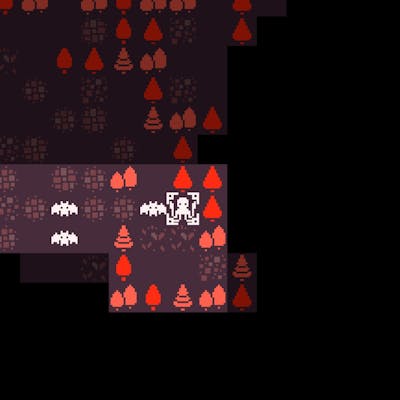I keep thinking about design and where to go next a lot. Especially if I'm busy developing something else (as I currently am), roguelike design is seemingly always on my mind, churning something that I actively have to sit down, frown at, and evaluate. Sometimes in that frantic jumble, I see the shape of what I want to make. That's the topic of this post: my next big thing, and where I'm stealing designs from wholesale.
Larger Than Life
Most traditional roguelikes are about the rogue, the cunning bloke who, at the end of the day, brings back a piece of jewellery from a deep hole. We start with very few things and build up our inventory along the way. The dungeon is just dangerous enough that we might live. But... What if we were simply indomitable to begin with? Summoned here against some collective better judgment, a demigod as feared as they all should be, yet probably still better than the evil below our feet. What if the evil inside the dungeon is truly sinister? What if its job is to learn how to exhaust us, to trap us, defeat us? How do we design dungeons that aren't there to be beaten, but to almost be beaten while being seemingly easy every step of the way?
The inspiration here is coming from so many places, including (but not limited to!) Godbound, an RPG where the players are literally demigods from the very beginning, controlling whole arcane domains, expending their divine effort to maintain spells that D&D mages can only dream of. A fourth-level party once spent a half hour of playtime seriously discussing how hard it would be to simply go to the moon and back with their powers. It was a joyride, but also intensely hard to imagine enemies that could hinder their mission. You have to go full Lex Luthor while they're still on that high, plan twenty steps ahead and let them think they're winning when you were simply waiting for them to be at their weakest.
It's also coming from Warhammer40k, and specifically the Astartes short film, wherein a handful of space marines go into enemy territory, vastly overwhelmed in numbers, and yet nothing is a problem. They live through guns, more guns, larger guns, two psychics with superpowers, an overwhelmingly alien psychic influence, and being drawn up into a place called the IMMATERIUM -- can't be good. And yet that was the only way to get them off that ship - throw them into the literal unknown. We haven't seen them die, so they'll be back, but in the meantime, they're off on another adventure, mostly unphased by everything that happened.
The marines end up just a bit more tired. I like this design. Stephen King's Gunslinger loses two of his fingers near the start of his adventure. It's not overly relevant, but it makes him more tired. Terry Pratchett's Granny Weatherwax comically trips only over her own viewpoints, her own perspectives her only limitation. It's not stated as such but every time we come back from an adventure with the witches, she's more tired. My viewpoint is that a character like that can't die, just decide that it's been enough. Not quite superhuman, but still larger than life.
Can we have that in roguelikes, games famous for how open-ended they are, how unscripted and procedurally generated? I think so, but we need to rethink health.
So, how would this work?
Let's start from the top and how D&D has done it since long before. You have hit dice. Each hit die brings in a bit of hit points into your health pool. So for example, you might have 2D6 and 1D8 as your three hit dice. Your health pool now has 20 hit points total. If you imagine it as a health bar, it would be a single bar consisting of three parts: two segments of 6 and one of 8. Your hit dice go in order - if you lose life, you lose it from the rightmost segment, and if you gain it, the left most empty segments get filled up. The basic mechanics are quite familiar-looking:
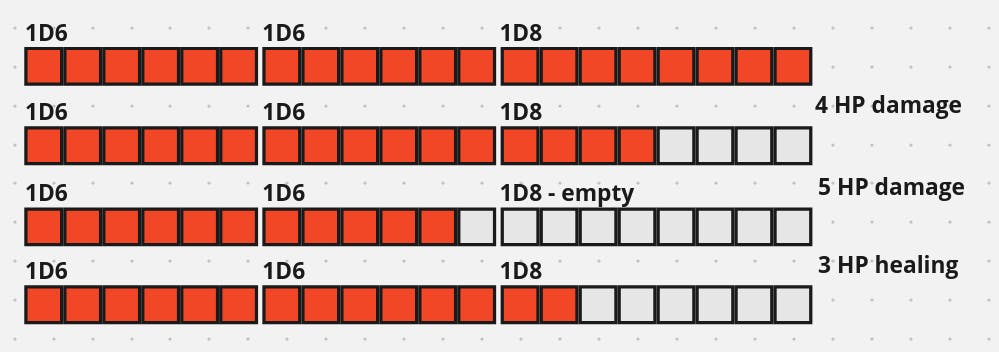
We have a segmented health bar. The number of hit dice a character has is their Influence. This isn't a renamed version of Level, which is also a thing we'll be using: a character's Level is a growing number. Each new level gives you one more hit die, and thus increases your Influence. However, you can gain hit dice in other ways and increase your Influence without changing your Level.
Your Influence is the measure by which a character's worthiness can be compared against another. If your opponent has at least as much Influence as you, they are considered worthy. Worthiness is important because your damage depends on it: if you're fighting worthy foes, your damage is dealt to their hit points. If you're fighting unworthy foes, you're dealing damage directly to their hit dice - two damage is scaled to the size of these hit dice regardless. Also, damage to unworthy foes spills over to nearby foes. Here's an image showing a character hitting a foe that has 3D6 hit dice. The character's hit dice aren't defined but to make this situation fit, in the top case they'd have to have more than 3 hit dice (so that the foe is indeed unworthy) and in the lower case, at most 3 hit dice (so that the opponent is worthy).

Damage to unworthy foes is out of this world! It's absolutely crushing, and it spills to foes nearby - it's a power fantasy that would really define our Larger than Life goals, if we handle it well. If the game isn't careful, it's a stroll through the park and you being powerful means nothing. If every foe is worthy, this whole system doesn't even really matter, either. A tight balancing act is needed. On the other side, if an opponent sees you as unworthy, their damage is going to hurt. We need to make sure that the design doesn't simply end up in a one-shot-kill every single time. This is where one's Innate Domains come in.
"Innate Domain" is a term I really like. They use it in the English translation of Jujutsu Kaisen, and here's how they define it:
An innate domain is a mental landscape that embodies the mind of an individual which they are born with. Innate domains serve as the foundation of an innate cursed technique, unique abilities congenitally engraved into the user's body. Innate techniques are proprietary and comprise eighty percent of a sorcerer's intrinsic skill set, making them nearly impossible to mimic.
To transition this description to game terms, every level you've gained has carved out a part of your innate domain - that's basically what a Level would mean, in lore. You can't use it until it becomes dry and visible to you for the first time, like an ancient shrine at the bottom of some deep riverbed. Even then, it won't become obvious if you simply lose health: only emptying the entire hit die triggers discovering your Innate Domains. You can imagine every hit die that comes from leveling up like a card with a front face and a back face - the front face is the health, the back face is an epic ability that you don't know and can't use until something forces you to flip the card around. Suddenly, you're weaker (measured in health), but both more informed about your abilities, and more powerful. Having hit dice like this becomes a catch-up mechanic, in a way.
Discovering Innate Domains also makes unworthy enemies more annoying, and gives them a place in the story: if a silly little goblin chips at your health just enough for your hit die to not be one-shot by a worthy foe, your chances about discovering your innate domain drops - suddenly, they make you -- not scared of their massive numbers, not scared for your life, but tired. And that's our design goal.
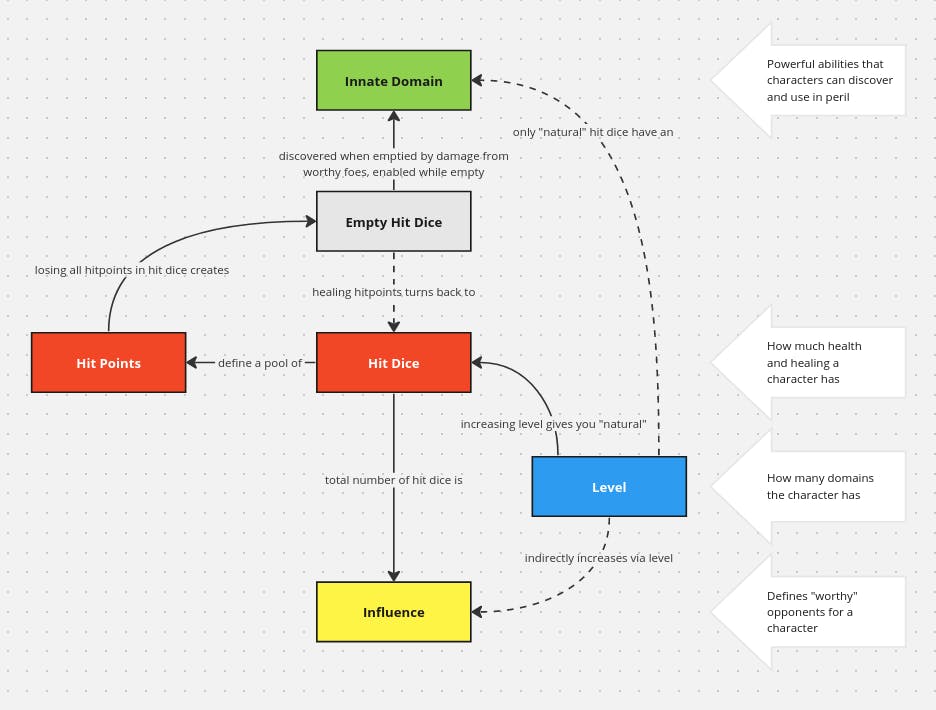
It quickly becomes apparent that one's Influence and furthermore its plasticity is what can define whether a turn in combat becomes deadly or not. Here's some numbers to help this along. Imagine you're a 3D6 character. You're going against a 3D6 character - you're a worthy foe. Then they don some armor and get an extra hit die from that - it's not "natural", and doesn't have an Innate Domain to it, but it's still there: you are no longer a worthy foe from this character's perspective and are thus an easy kill. If they can do 2 damage, you went from a full bill of health at 18 to 6. On the other hand, if you hit them for 2 damage, they went from 22 to 20. Unscathed.
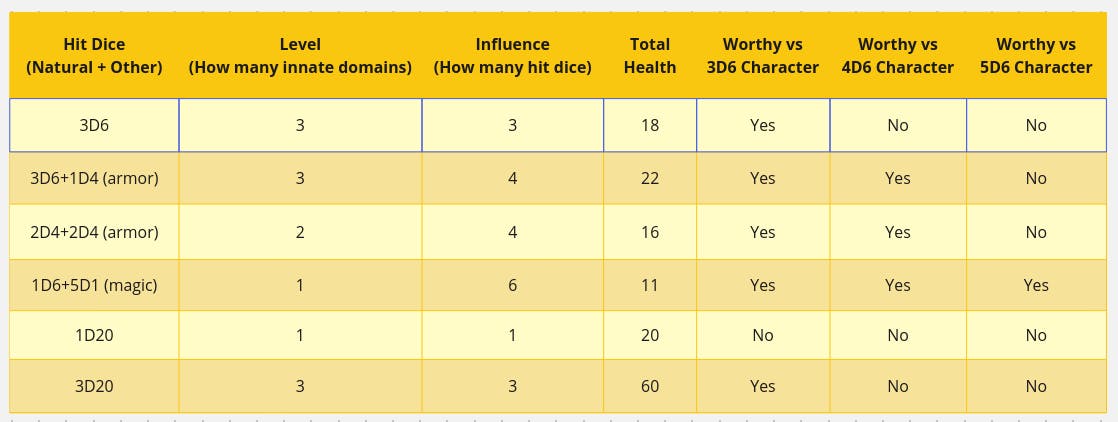
I'd like armors to break when emptied - this would make item management make sense and characters would have to spend turns preparing, which is always nice to have in a fight. Several turns to just mind your own business before going back into the fray. That said, if you can survive enough to deal 4 damage to this armored character, you're actually okay: they'd go down to 3D6, you'd become worthy once more, and sure - it's still not the best situation, but you got it under control. I can see this as a mastery point I'd like to latch onto. It's not about health, after all.
Let's look at a different enemy. You enter a room and there's a 1D6 enemy right there. This is basically dead already if you choose to attack with your 2 damage, but then you give it some room to cast a spell and by the time you get to it, it has +5D1 magic cast onto it. Faint blue sparkles above their head make them suddenly more than worthy. They have 6 Influence, and you have 3 -- this is much worse than a bit before seemingly, but the size of the added dice matters in this case: doing 4 points of damage will still damage 4 points either way, as each of their magical hit dice are exactly 1 hit point wide. Magic doesn't break, though, but rather expire with time, so even though you harm them for, say, 4 damage, their Influence is still higher and you should be afraid! Spells have to give small bonuses and give them for a short time, it seems. You need to know when to use things to make them effective, and so should your enemies.
A 1D20 enemy seems like a standard damage sponge, but actually, they'd die instantly against even a 2D1 foe with 1 damage, which paints some nice images into possibilities: we can have weak-looking masters of their craft who are able to defeat much larger hunks with ease and have it be a part of the system. They both literally can be Larger than Life in their own ways.
Finally, the 3D20 case is interesting. This is a very large foe, and if you're a 3D6 enemy with 2 or 4 damage, it's a menace probably: you're now equally scaled and both hit for some direct amount of damage to your hit points. They have more. This feels like a sponge and as if you're losing. Employing what we just talked about here can be a life saver: you just need one single hit die more for a couple of well-planned turns, and you're suddenly dealing 2 or 4 hit dice of damage killing them in one or two hits. If they're sneaky, as we said they'd have to be for the game to be engaging, they'd try to evade this and have a plan to retaliate. This now sounds like a closed loop: maybe you let them hit, discover your Innate Domains, use them effectively, learn about yourself, and prepare for the next fight.
Uncovering Hidden Information
It's about time to close shop for the day, so let's just take a look at how things change if only some of the information you've seen up until now is shown to the player. I think the difference is profound. Knowing only the Influence of a foe up front makes the most sense, as this is their overall "image" you form as you approach. The image might change with what they do (drink a potion and start to grow wings, stand up to their full height, etc.), but it is something observable, unlike the Level they have which is a very innate statistic.
If you know that your enemy has 6 Influence, but not how many of which hit dice they have, this is interesting: you know they're dangerous to you (presuming a standard 3D6 character on the player's side), and how dangerous, but not how hard it will be to shave that down. Maybe you focus on them instead of the other foe in the room, and then their magic subsides and they become quite meek, while the foe you haven't even scratched is the actual boss. Or maybe your first hit gets at their armor and they suddenly fall to 4 Influence. Or maybe nothing happens and you deal 2 damage and they're planning to wreck you now.
We need a way to gleam information about enemies. I'd love to do it as a function of proximity. If you tango with your foes, you're learning. Every attack that misses you barely gives you insight. As we're talking about a traditional roguelike, this makes our positioning very important. It also means our enemies need to have attacks that aren't bumps - it's hard to telegraph and boring to dodge those. Instead, we can learn from shmups and telegraph attacks up front, have the first few rooms before a worthy foe be "training" rooms where similar things happen and you get a chance to read a few moves. Gaining insight shouldn't be tied to an enemy but a move or ability instead.
"Oh gotcha, these are the same spells as before, I know what that does, I can see it."
If you do it right, you won't just go through and slaughter all the unworthy enemies. This, in fact, is the evilness of your enemy - just going through the fodder won't teach you much, leaving you open for serious damage later, but taking them slowly might actually be taxing and make you tired. We're exactly where we want to be. So, how do we do movement in a way that isn't bumpy and is predictable enough for consistent telegraphing? Well, let's have direction movement as expected, but make it not be how you fight serious foes. To do that, you need to escalate: your attacks might include a vector towards, from, or even perpendicular to an enemy. So, without caring about where exactly they are, you might fly towards them. Or fly away from them. Or simply jump to the side. In these terms, your positions turn from a grid into a sort of malleable field, where you can either move a bit, or move a lot but only guided by other actors. Combining the two gives us very dynamic combat: you fly towards something, but anticipating its attack, you cancel at the last moment and step one single side-step to the right. Their attack misses and you learn about their damage output. Mastery. Larger than Life.
I'm imagining that the interface for this kind of movement would be choosing a target and then a distance. We can implement the concept of Fray Dice from Godbound here: every turn, you simply do some damage to some foes, by reflex. You're just so scary that your unworthy opponents just get cut apart. This could be nice for attacks that you "cancel" mid way. You do that, but they still hit something. You intended it.
Also, a decent show of mastery that might help with repetitive learning strains (if we fought some enemies before but we died and started over, so we know stuff even when the character doesn't) might involve reincarnation. This is a weird concept I've been thinking about for a while now and I imagine it kinda working like this: you can choose to not do stuff in turn order but rather to plan your moves and commit to them. If you don't get hit and manage to wound a worthy enemy enough (maybe even kill them), you level up through reincarnation! I'd think about scaling this with the amount of coolness you expose, but just imagine this...
You enter a room, there's a strong enemy there and you don't know much about them, but you kinda know from some fluff around the level what you're dealing with. You know they have armor, you suspect they have magic that takes two turns. You also see that every minor enemy used a spear, so expect a piercing attack. You commit your moves: you approach them but stop two tiles away, move one to the left to get out of their way (in the future), drink a potion to gain 2D2 hit dice and +2 damage for 1 single turn, and then hit to your right. You put this into motion, and by the time you've approached, they've started telegraphing a piercing attack towards you, they've also lost their magic. You're safely out of their way, drank your potion, they're now no longer worthy and then you hit and kill them in a single strike as they pierce the empty space where you've been standing a moment before. Bam. Done.
In Jujutsu Kaisen, these kinds of strikes are presented as a Black Flash.
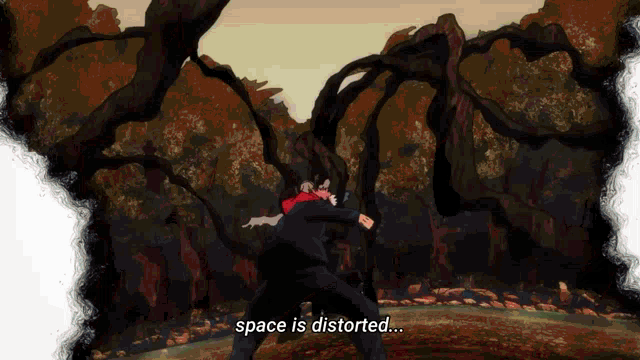
It's the coolest move you can do, and it recovers some health for its user, and also teaches them about themselves and their technique -- quite similar to how we view leveling up! It fits, so it sits. Now we just need to make all of this actually work. We've skipped over any sort of narrative, worldbuilding, even procedural generation, any mentions of metaprogression, but it is what it is. This might end up being a boss-parade, like Dark Souls, we've talked about that before and maybe this is an extension o that idea. We'll have to wait and see. Until next time!
